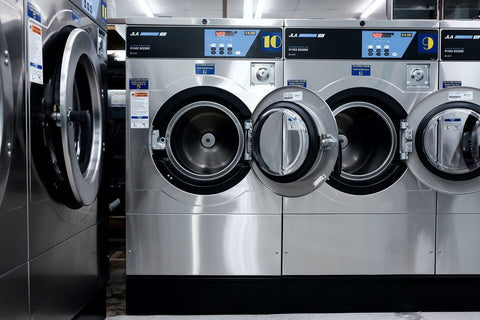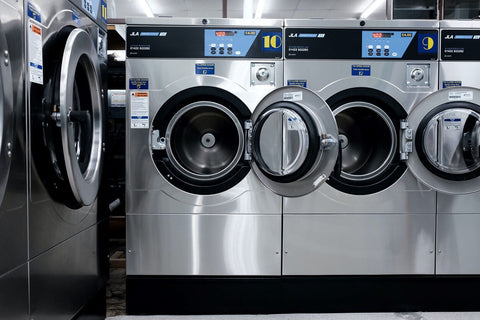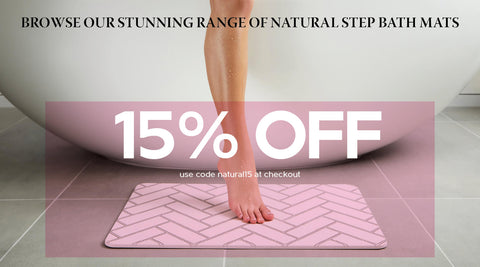
Can bath and shower mats go in the washing machine and dryer?
Opinions vary on this question. Manufacturers and resellers of bath and shower mats tend to say it’s OK to machine wash as long as you follow the instructions carefully, whereas appliance engineers people say NO! and question why the manufacturers aren’t being upfront about this.
The answer is, if you want your washing machine to last and you care about the planet, it is best not to machine wash and definitely don’t machine dry your bath and shower mats.
What the experts say?
Scott Flint is an appliance repair specialist with over 30-years experience, he says that even though it appears a large bath mat may fit in your washer ok, it will not be good for the machine, he recommends using industrial coin operated washers and dryers for bath and shower mats.
‘bathroom mats absorb so much water that they end up weighing far more than the washer was designed to handle. Modern washers have a much faster spin rate than washers of the past — up to 1,200 revolutions per minute during high-speed spins! These faster rates create large amounts of force with heavy items, and the increased weight tears the washer apart’
Some bath mats become very heavy when wet
This puts extra strain on your washing machine
- Microfibre becomes up to 7 times heavier
- Cotton absorbs up to 27 x its own weight
- Rubber is hydrophobic meaning it absorbs no water. Do not put in washing machine as it will break up and clog.

Think about the cost and environmental damage
The cost and environmental impact of replacing a washing machine is huge, with about 400kg of co2 created during the manufacturing of the machines. There is an awful lot of steel, plastic and electronics involved plus they are heavy and are shipped a long way. If you look after your machine, it could last a decade or more, misuse it, and you may replace 5 times in that period. That’s a whopping extra 2 tonnes of carbon created, more than going on a long-haul flight to Australia.
Tips for reducing impact of machine washing bath mats
Although not advised, if you are going to machine wash bath mats that you follow the recommendations below:
- Take it outside and brush down to remove dust and debris which will block the machine
- Don’t overload with other linen, the bulk of bath mats can get in the way of effective washing of clothes
- If your mat has a vinyl or rubber back, wash it at low temperatures and use an anti-bacterial detergent and spray with an enzyme cleaner to stop it smelling.
- Check the instructions to make sure its at the correct temperature. Materials will vary
- Never put in the dryer if your mat is vinyl or rubber backed as it will degrade and block the machine
- .Dry in the sun where possible, sunlight naturally kills bacteria, mold and viruses
Are there alternatives to bath mats that need machine washing and drying?
There are other bath and shower mats made of hard materials that can be wiped clean rather than machine washed and dried such as bamboo, softwood or natural earth stone. This saves you loads of time and money by reducing electricity consumption.
Bamboo and wood mats are ok but they don’t absorb water so it ends up on the floor and needs wiping up. Natural Earth Stone has a unique porous structure that absorbs the water making them dry to the touch, then dries out quickly. Say goodbye to damaged washing machines and endless, costly washing.
Can rubber backed bath mats be machine washed and dried?
Not all bath mats are made of the same material so the severity of the problem will vary. Bath and shower mats with a rubber backing or made entirely of rubber should not be exposed to heat, so definitely no hot rinses and definitely no machine drying! The reason is that heat will cause the rubber to degrade and clog your machine, equalling more expense and environmental damage!
Ideally an entirely rubber mat needs to be hand cleaned with an anti-bacterial agent as machine washing a mat at low temperatures will not kill the bacteria anyway. The same goes for a cotton bath mat or virtually any soft mat, they will need an anti-microbial agent added to the wash if they are to be cleaned effectively in a washing machine, there is some debate how effective these are at lower temperatures.
How Often Should You Wash Your Bath Mat?
Feet carry a lot of bacteria on them due to being in warm, often damp conditions so it goes without saying that bath and shower mats can quickly become breading grounds for bacteria, particularly mats that retain moisture and lie damp and unventilated.
If you have a highly absorbent mat that doesn’t dry out quickly and is in regular use then washing it every couple of days is going to be advisable. Damp conditions lead to 10,000 times more bacteria formation than dry conditions, the bacteria can quickly infiltrate the fibres of your mat. Toilet flushes have also been shown to create a plume of aerosolised bacteria that spreads a couple of metres and settles on surfaces. If your mat is close to a toilet and damp then an unhealthy cocktail is created. The best way to prevent this is to put the lid down when you flush.
If you can dry your mats in between uses by hanging them up, ideally in direct sunlight. The quicker they dry, the less opportunity for bacteria to multiple and the UV-C from sunlight helps to kill bacteria, mold and viruses.
How do I stop my bath mats from smelling?
I’ve seen some incredibly irresponsible remarks online suggesting some mats are so cheap you are better off buying a new one than washing them! This disposable mentality is something we fight against and only produce products that last.
A natural steps bath mat dry so quickly and are naturally anti-mildew and anti-microbial so never smell in the first please, just wipe clean to keep them looking clean.
If you do have a smelly bath mat an enzyme-based cleaner is the best way to remove any mould formation. We found a natural formulation you can make at home using common ingredients. Otherwise, dry in direct sunlight and ventilation between uses as much as possible.
How Often Should You Change Your Bathtub Mat?
This depends entirely on what the mat is made of. A natural earth stone mat will not require changing ever as long as it’s looked after, where as a cotton or synthetic soft mat will need changing more often, depending on wear and tear.
If your mat is rubber backed, you need to replace it when the rubber begins to flake off as water will soak through to the floor and cause damage, especially on wooden floors
If your bathroom gets frequent use, it is advised to replace your fabric bath and shower mat every six months to a year. This recommendation is based on safely avoiding foot fungus or other unpleasant bacteria that can flourish in a heavily used bathroom.
To find out more about the revolutionary Natural earth stone mats please visit the Natural steps bath mats website


Comments (0)
There are no comments for this article. Be the first one to leave a message!